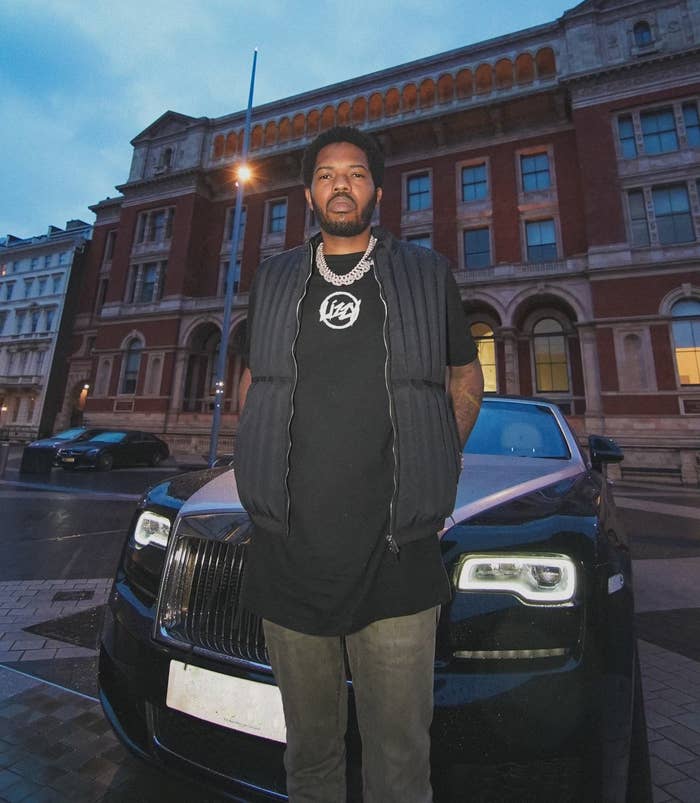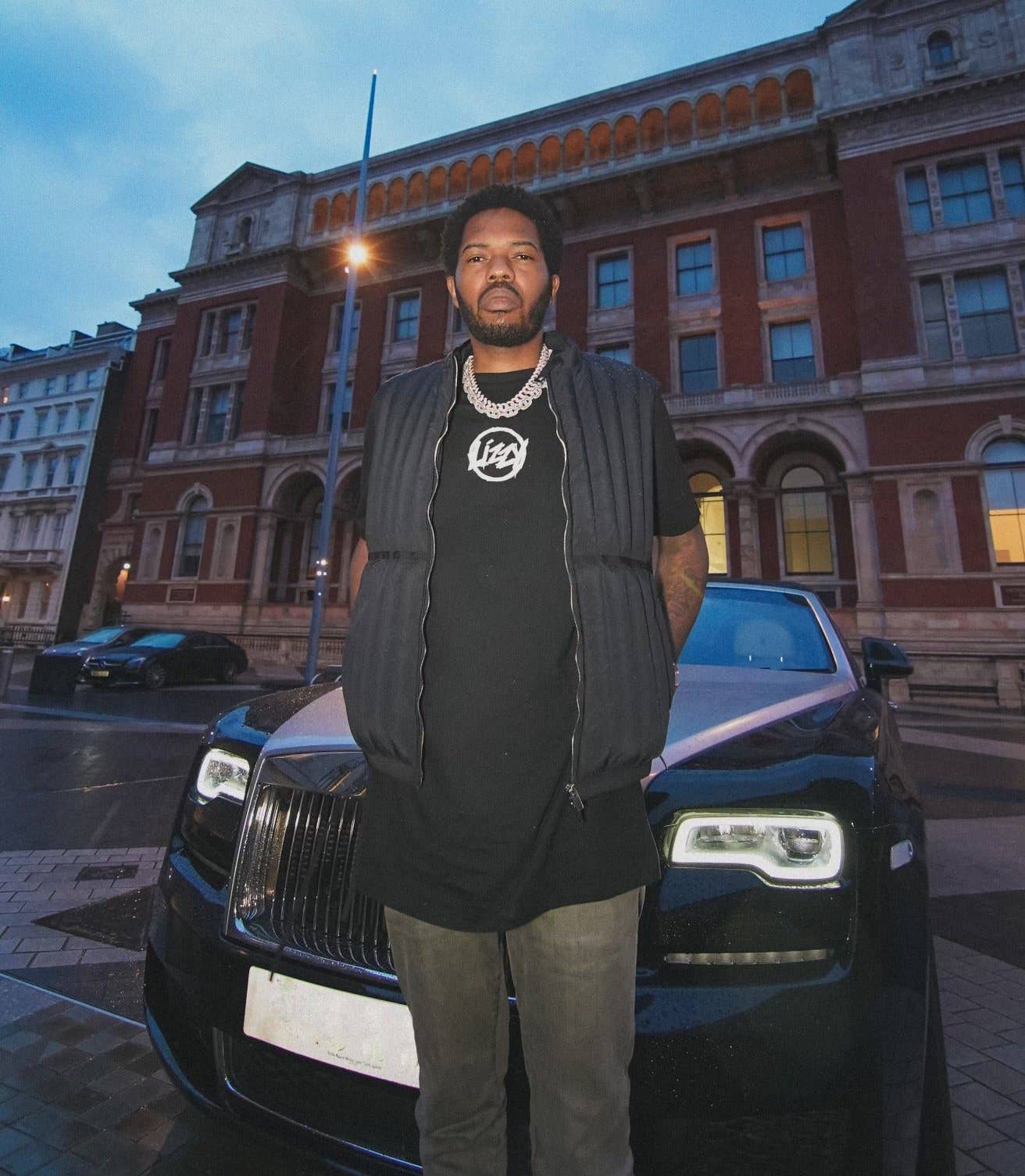
If you came up in the mid-2000s and you weren’t blasting out “That’s Not Gangsta”—Dion ‘Sincere’ Hamilton’s breakout single—then you were doing it all wrong.
The 2005-released street smash—which was a fan favourite on Channel U (R.I.P), the only TV station dedicated to underground, unsigned British music talent—emphasised Sincere’s belief in the power of financial freedom early on, with lines like: “Them Ps that you left on road have been invested/We buy houses, yeah that’s gangsta.” It’s a message he instills in the artists he manages today—West London rapper Fredo and rising rhymer Meekz Manny—which is reflected in the depth of their own lyricism.
Despite coming from a UK rap background, Sincere also built bridges with the grime scene through his cousin and fellow North London legend Scorcher. They teamed up with D Double E in 2007 on “Reppin London”, and both that track and “That’s Not Gangsta” were released through Sincere’s own label, Young Entrepreneurs Records. A decade and a half later the label’s stronger than ever, reaching platinum status for its 2018 drop “Ay Caramba” with Fredo, Young T & Bugsey, and charting more recently with Central Cee and Fredo’s “Meant To Be”. Both cuts were released under the Stay Flee Get Lizzy banner—a production house/creative hub led by Sincere—with a full project due out later this year.
In the years that followed Sincere’s early success, the UK scene at large found itself compromising in the hope of mainstream recognition, and more importantly mainstream money. Sincere wasn’t immune to this, and became disillusioned with making music. He stepped away from the mic and used his entrepreneurial nous to tap into other revenue streams associated with the culture, going on to launch a merchandising company—Blanks Factory—with his business partner, and selling streetwear through Lizzy Clothing. His opportunity to get back into the business of music came when he approached Fredo at his video shoot for “Trap Spot” in 2016, and the rest is history.
We caught up with Sincere to talk about his journey from the mic to management, rap music’s influence on fashion, doing things your own way, and much more.
“I feel like, as an executive, I need to connect with the music—that’s the most important thing. So having my own project allows me to level with the artist as a peer, as opposed to being this executive type of character.”
COMPLEX: Thinking back to the “That’s Not Gangsta” and “Reppin London” days, what was the scene like in terms of infrastructure and knowledge?
Sincere: If we go back a couple of years before “That’s Not Gangsta”, my first record was with Skinnyman, who’s a UK hip-hop legend. Back in those days, the only place I remember being able to get played would be when [Tim] Westwood would play UK stuff in the last 20 minutes of his set, or DJ 279 on Choice FM. This was very early on—the scene was very niche. Hip-Hop Connection was the big magazine… I’ve been in the game since then. When 1Xtra launched and Channel U came along, for me, that’s when the scene and the business really took a leap forward. We had an outlet now, and could get our sound into people’s houses across the country. My background is UK rap, but obviously, due to me being cousins with Scorcher—who was big in the grime scene—I didn’t get into that scene, but I was making tracks with Ghetts, Wretch, D Double E. That gave me a bit of an edge and a USP over other UK rappers at the time. But the infrastructure was very limited and you had to work hard just to get a little bit done. That’s made me who I am today. I got to learn so much, and I’m grateful for those days.
Would you say that instilled a sense of independence in you?
150%, bro! Only a few people got signed in the early days. Skinnyman was signed to Talking Loud, I believe Lethal B got signed when he made “Oi” with More Fire Crew, and then there was So Solid. Deals were few and far between. Obviously, we had Dizzee and Wiley, but it was like one or two artists might get signed a year. It was rare. Having a ‘deal’ was a big deal, but now everyone’s got some form of deal. It was a completely different world back then.
At that point, could you see the potential for the scene to reach the heights that it’s currently at?
I could see it happening, but then I lost faith a few years later. But, at that point, I was a 19-year-old, super ambitious kid who thought anything is possible. As the years progressed, I started to understand that things are not as simple as you’d like them to be. I had a rude awakening. I started to second-guess how far I could take things, just because of the way the scene progressed.
What was the rude awakening?
I feel like there was a different skill-set required to make it. There were different rules. You didn’t have someone being successful for being themselves—you really had to compromise your sound. I won’t mention the names of any artists, in particular, because I attempted to compromise my sound too, in order to make a living out of music. At that point, it’s like, if you’re compromising that much, who are you, really? I felt I wasn’t being myself. Around 2010, there came a point where I stopped making music because I was becoming something I didn’t want to be.
If you look back at that period, pretty much everyone was compromising their sound in some way.
Everyone apart from Giggs.
Yeah, his work definitely stood alone. Some of the grime scene’s biggest names—Skepta, Wiley, even Ghetts with ‘Sing 4 Me”—they all had periods of compromise.
I think, because those guys are icons in grime, you can never take that away from them. Someone like myself, and artists like me, we weren’t that fortunate to have the stamp of creating a genre. They’re legends now. Those years are forgotten. Skep made a conscious decision to change it up with “That’s Not Me” and do his thing.
Do you feel that artists like yourself and G FrSH were ahead of your time in terms of the vision you had for UK rap?
Yeah, most definitely. I had my Kid Base era, tryna do different things, sampling Four Tet and Flume and Hudson Mohawke. We were way ahead of the curve. We were looking at what Kanye was doing, and Jay-Z, and trying to emulate that but still put our own spin on it. There just wasn’t the audience for it at the time.
Concepts like Young Entrepreneurs Records and Stay Flee Get Lizzy have been with you pretty much from the outset of your career. Did your belief in them ever waiver?
It did. And then I went and set up Blanks Factory, a merchandise company, which I still have today. I’ve done business with most of the relevant artists in our scene. I’ve done deals with Giggs, slowthai, Skep, Stormzy, FKA twigs, I’ve done the merch for Kano for years and I’m currently doing Headie One’s merch. That business took a few years of my life; I co-founded it with my business partner, Johnny. But then I saw a window of opportunity to get back into music: by managing Fredo. That was like my first step back.
“I think any human being needs to spend time doing something for them. So, selfishly, Stay Flee Get Lizzy is my project; it’s my time.”
What re-motivated you to move back towards creating music again?
I just wanted to do something for me, as opposed to the management and merch business that I’m in, which is a service industry. It’s amazing and I’m grateful for it, but I think any human being needs to spend time doing something for them. It’s important to take some time for yourself and do something for you. So, selfishly, Stay Flee Get Lizzy is my project; it’s my time. Within reason, I choose when the single drops or what the video looks like and how the song sounds. It’s my creative outlet. And it’s a way for me to connect with the next generation and keep my finger on the pulse. I’m getting to hear so many artists that I probably wouldn’t if I wasn’t working on this project.
I know we’re a while off the eventual release, but what’s the vibe that you’re cultivating on the project?
I want it to feel like London, to sound like London Town. I want people to listen back in 10 years’ time and know that’s how music in London sounded at that moment. It’s about capturing a moment in time, mixing the current sound with older sounds, like we did with me, Fredo and Central Cee on “Meant To Be”.
Are you tempted to pick up the mic and spray something?
Not right now. But if it hits me, then I’ll definitely jump on something.

